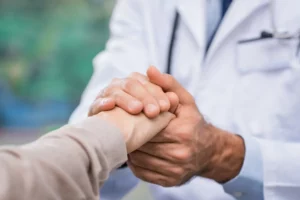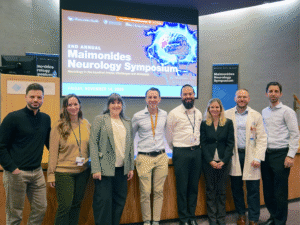Maggie McKay (Host): Aging, it’s a fact of life, but there are so many things that nobody tells us about until we get there. So to get informed and prepared, we’re going to talk about the facts of getting older. My guest today is Dr. Jenny Breznay, Program Director in the Division of Geriatrics at Maimonides Health. She’s going to fill us in on everything you should think about once you hit 65.
This is Maimo Med Talk. I’m your host, Maggie McKay. Dr. Breznay, so happy to have you here today. I can’t wait to hear what you have to share with us because it turns out there’s a lot to know about our later years.
Jenny Breznay, MD (Guest): It’s great to be here. Thanks.
Host: Just to start up what things become more concerning or have greater focus when a person turns 65?
Dr. Breznay: I think that function and the focus on muscle strengthening and making sure that you’re really attending to your body’s need for regular activity becomes a primary focus. So, making sure that you have an exercise or at least an activity plan for every day, whereas you might in your twenties, thirties and forties have taken for granted activity. Now you really have to plan for some walking, swimming, biking, stretching every day to make sure that you’re not losing muscle mass as you age.
Host: Is walking enough?
Dr. Breznay: In general, I think that we should be aiming to get our heart rate up and walking probably isn’t enough for the average 65-year-old, honestly, but it really depends on how your own heart responds. So I would say that’s a conversation for every individual, with their physician and what you should be doing is trying to identify what your maximal heart rate is and trying to hit about 80% of that for at least 20 minutes, three times a week. That’s sort of the target.
Host: Okay. And what’s a healthcare agent. And why is it so important to have one?
Dr. Breznay: Healthcare agents are the individual that healthcare proxy identifies. So, it’s a legal document that most people sign when they get married or when they’re changing their employment, it could be at any time in the life cycle. It doesn’t have to be when you are 65. And essentially, it’s just like somebody identifying a person who can take care of finances. It’s somebody who can help with decision-making around medical issues as you face them, and might not be able to make them yourself. So we always worry that as people age, they have more medical crises that will leave them unable to make decisions, and they’ll have to turn to somebody to make decisions for themselves.
And healthcare agent would be that person. It could be your spouse, it could be a sibling, it could be a parent. It could be anybody in your community. It could be a religious leader, but it really should be somebody that you trust will reflect your values and your beliefs about what you would want in case of a medical emergency.
Health care proxy forms are available online free. If you Google healthcare proxy, you can find a very easily downloadable form. Each state has specific requirements. In New York state, which is where Maimonides is, the requirements are very minimal. So you have to identify the person, by their address and phone number. You have to have two witnesses that are at least 18, sign and identify themselves by an address. And then you have to have the patient themselves sign the document or indicate that they agree with the form. So it’s very, very simple. But ultimately something that you could write it out.
But I think most people feel uncomfortable doing that. And if you’re interested in the particulars, you need to look at the state that you reside in for their actual template, but it’s a very simple form.
Host: Interesting. That’s good to know. Why is gastrointestinal health something aging adults should be aware of?
Dr. Breznay: So a classic theme in aging is muscle mass decreasing in strength and activity. That’s a general bodily development, no matter where you are, your muscle mass decreases. So your actual weight of the muscle decreases and its ability to contract decreases. In the gut, what that means is that the tube, that lines the whole intestinal tract from your mouth all the way down, is also lined by a muscle.
So essentially that muscle, decreases in mass and decreases in strength and you don’t have good contraction. You don’t wind up swallowing as effectively or moving food through the digestive tract, creating stool. And, ultimately one of the major problems is constipation, which most people know is a result of aging, but many people don’t think about until they’re well into their eighties as something they should treat. But it is a predictable response of this slowing of the muscle in terms of its activity.
Host: What does a doctor tell a patient in their eighties with that problem to do, to prevent it?
Dr. Breznay: So I start very early. With most of my patients, I talk about digestive health, as a matter of say wellness. I first of all, bring up how do you feel about your digestion. Are you feeling like you’re having a lot of acid production? Are you feeling like you’re having a lot of problems producing stool?
So bringing it up as a point of wellness, as opposed to waiting until somebody says I haven’t had a stool in a week or two weeks and then there really two issues with digestive health. One is activity. So anytime you use a muscle in the body, it has a sort of mirroring effect. So if you are walking, if you’re doing anything athletic or fitness wise, you’re going to actually have more activity of the bowel. So that’s going to help move the digestion and ultimately prevent constipation and the other major issue is we don’t eat enough fiber. So in terms of prevention, I often talk about adding a fiber supplement, which is over the counter. Something like psyllium in Metamucil or FiberCon those are trademarked products.
You can get the CVS or Duane Reade or generic product, but they’re all fiber husk, and they all absorb water, bring water into the gut and help the stool move through. So that it has a lot of water content, that with the activity usually does the trick in terms of preventing constipation.
Host: Okay. What about cognitive decline? How does aging affect that?
Dr. Breznay: Every organ in our body declines in function in terms of its strengths or productivity from the age of 30 on. So our kidneys, our heart, our digestive tract, everything has a decline in function. And the same thing is true of the brain. Our neurons don’t fire as quickly. We don’t feel, we don’t sense, we don’t hear, we don’t see. Everything has a decline in function.
And the question with cognition really is when does a decrease in neurologic function, when does it impact the function that you have in your daily life? So we expect that people are going to have word finding difficulties and some may forget where they put their keys. These are typical complaints I see in my office, but the real concern is when does that loss of the immediate circumstance impact your ability to navigate things. So, going to the store and not remembering how to move in the store and how to find cans and produce and navigate the supermarket. You know, that would be something that would be very worrisome. So, I typically ask patients not only for their perspective on their cognitive decline, but also asks spouses, ask children. So it’s usually a very involved assessment to do a cognitive assessment, and cognitive is basically what makes us all individuals. So, it’s incredibly important to give focus to that area, but it’s also something that I think people are terribly frightened of the idea of losing their personality or losing their mind, or personhood. And so it’s a very fragile, delicate topic as well.
Host: What should aging people and family members of aging people know about a hospital stay?
Dr. Breznay: One of my favorite topics to discuss with new patients, especially patients with family members in the office, is this issue of what happens when you go to a hospital. It’s frequent that older patients and by that, I mean, somebody who’s over 75, who has multiple medications, who’s not suffering with any cognitive decline, they don’t have dementia. They don’t have neurologic problems, but the stress of the hospital stay, the disorientation of whatever it is, perhaps that they had a heart attack or they had an elective surgery on one of their joints, but it’s very disorienting to be in the hospital. And the reserve that an older person has to cope, their brain to cope with those stresses is really limited. And often what happens is delirium. So delirium is a medical diagnosis that describes what the lay person would say is confusion. They get very confused and it’s often at the end of the day, when there’s even less reserve, even less capacity to be able to cope with stress, you can see hallucinations.
You can see more abnormal behavior, agitation. So what I typically talk about with patients and families anticipating a hospital stay, is that anything that the family can do to reorient the patient in the hospital, whether it’s putting up photos or making sure that they have music, that they recognize foods that they might like, anything that they can put on the bed that would remind them of home.
Certainly, have a family member by the bedside, as much as possible to reorient them. All of that will actually have a significant improved impact on their medical course, it will definitely help to prevent the delirium that often occurs for the hospitalized elder.
Host: That’s good to know.
What are some of the services or programs that Maimonides Geriatrics offer?
Dr. Breznay: Aside from the full-service outpatient practice, where we have three full-time geriatricians seeing patients for outpatient management, we also are really blessed with a full-time social worker in our practice, and she not only supports us to do psychodynamic, supportive therapy with our patients, but she helps with a lot of the community resources that we refer patients to.
So that support from a social worker is unique. You won’t find that in really any other practice, in the Borough, at this point, so a social worker is essential to really well-developed geriatric care. In addition, the division also supports something called the Safe at Home Program.
Safe At Home Program is run by two nurse practitioners, geriatricly trained nurse practitioners, and they have primary care practices in the community where they follow elders who are unable to make it to our outpatient practice. So, these are home-bound folks that are typically tended by home health aides, family members.
You’d consider them frail elders, and these are typically patients that would be receiving no care until they would be coming to the emergency room for emergent care. And these two nurse practitioners provide a really unique opportunity to access care for this very vulnerable population and then we also have a liaison with a unit in the hospital, where one of our geriatricians is working full time on a geriatric care unit that focuses on the elder care of the inpatient. So, I think those are the three things I’d highlight.
Host: That’s a lot. That’s all great to know. Dr. Breznay, is there anything else you’d like to add that we didn’t mention?
Dr. Breznay: So one of the things that I think in many families struggle with is the idea of polypharmacy. So, most older adults, people that are over 75, 80
Jenny Breznay, MD (Guest): 80
Dr. Breznay: years old, wind up accumulating 10, 12, 15 medications a day. I have patients who’ve come in with over 20 medications a day. Sometimes they take them twice a day, three times a day.
And I think this accumulation initially is considered to be evidence of good care. Evidence of following protocol and doing the right thing. Because we’re so fascinated with pharmaceuticals in this country and we’re dependent on the idea that they’re helping us. Unfortunately, in the elderly, there’s so many side effects and so many difficulties related to the interactions between, so not just the individual one, but then the interactions between the many, and oftentimes physicians don’t wind up reassessing that. And yet to find a physician who can sort of take the larger view step back, know about all the medications from the various specialties and identify what medication might need to be titrated off, taking responsibility for that approach which we call deprescribing, I think that’s something that is extremely important.
It will become more and more important for the elderly, in the next few decades, because I think we’re starting to realize that a lot of our hospital stays are related to polypharmacy, too many medications. So looking for a doctor that can help with reassessment of the medications that you’re on, I think is very important and geriatricians definitely feel comfortable doing that.
And I think oftentimes I see patients in my office who come to me because they have a sense that their doctor isn’t really feeling comfortable right now doing that.
Host: Thank you so much, Dr. Brezney. This has been educational and informative and very helpful I’m sure to people who’ll be listening to it. And we appreciate your time today.
Dr. Breznay: Great. Nice to talk to you.
Host: You too. To make an appointment, call 718-283-7071. Or to find out more about geriatrics, visit maimo.org. That’s M-A-I-M-O.org. You can also check out all of our podcasts with more topics that might be of interest to you. This has been Maimo Med Talk. I’m your host, Maggie McKay. Be well.







